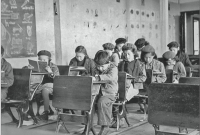Support strong Canadian climate journalism for 2025
Prime Minister Justin Trudeau announced the appointment of seven new senators today. One of them is a Manitoban, Justice Murray Sinclair, who gained national recognition due to his work leading the Truth and Reconciliation Commission.
Justice Sinclair, who comes from the Ojibway Nation, has been involved with the defence of Aboriginal peoples’ rights for more than three decades. He was appointed associate chief judge of the court of Manitoba in 1988, making him the first Indigenous person ever to hold such position. That same year, he was also named co-commissioner of Manitoba's Aboriginal Justice Inquiry.
Sinclair might have many distinctions in his long career, but he refers to today’s Senate nomination as “a sacred honour.”
His main goal in the new post will be to continue fostering the reconciliation between Indigenous and non-Indigenous people. He plans to do so by monitoring and supporting legislation “that deals effectively with the past legislation and the principles upon which that legislation has been passed in the history of this country,” he said in a short interview with National Observer in Vancouver.
Justice Sinclair doesn’t plan to work in the isolation of the red chamber. He said he also wants to stimulate the public’s engagement with the legislative body, acknowledging that recent scandals have diminished people’s trust in the institution.
“Trust is a two-way street," he said. "I think the Senate certainly has to show that it is an institution that is entitled to be trusted, but I think the people of Canada also have to learn and begin to trust their own institutions, and so it works both ways. That’s really what I hope I can contribute to: the mutual understanding of how it is that we can go forward and work together.”

Moving forward with the Truth and Reconciliation Commissions report
Before scholars, students and First Nations representatives from Canada and New Zealand, Justice Sinclair spoke at the University of British Columbia on Friday about the many lessons that came out of the TRC.
“With the Truth and Reconciliation Commission, we were able not only to educate the public but to give a sense of direction to the public in the future — about what it is that needed to be done to ensure that the path to reconciliation is clear as we move forward,” he said.
He emphasized that the TRC was not a government-created commission.
"The Government of Canada often claimed credit for setting up the Commission, but in reality the Commission’s existence came about solely because of the law. (…) While the TRC did report to the Parties, it was subject only to the supervision of the courts,” he said.
Still, there was something more important that Justice Sinclair kept bringing back: the need to reform Canada’s educational curricula to include both the legacy of the residential school system, and the history of Aboriginal peoples prior to the European settlements that started with Columbus 1492-voyage.
“Not only our Aboriginal people have been educated in this country in a manner that has caused them confusion about who they are, but non-Aboriginal people have also been educated in a manner that has caused them confusion about us as well,” he said.
To support his statement, he quoted the speech Sir John A. McDonald gave to the House of Commons in 1883: “When the school is on the reserve, the child lives with his parents who are savages; he is surrounded by savages, and though he may learn to read and write, his habits and training and mode of thought are Indian. He is simply a savage who can read and write.”
Sinclair said that prior to 1970, when a revision of the educational curricula started, this kind of attitude towards Indigenous people was the rule, therefore, many leaders and prominent Canadians were raised under such paradigm. “That education has influenced each and every one of us and each and everyone of them. As an Aboriginal student, for example, it denied to me any sense of pride that I might have in my ancestors and in their history in this part of the world. For my non-aboriginal classmates, it taught them that we were wild, savage, and uncivilized.”
Justice Sinclair added: “As commissioners, we knew that the way we had been educated in this country is the reason why we are at the state we are in today.”
He outlined the problem, but also what he sees as the solution. For him, all students, Aboriginal and non-Aboriginal need to learn “what the story of this country is all about and that it did not, in fact, begin in 1492; they need to learn about the aboriginal Nations that the Europeans met, about their rich linguistic culture, about what they felt and what they thought, about why they negotiated treaties in good faith and why leaders fight so hard to defend those treaties."
Sinclair is convinced that Canada's educational system “can fix what it has broken.” The way to do this, he says, is by also teaching all children living in Canada “how to speak respectfully to and about each other in the future. It begins with teaching them the truth, about this country and its history, and knowing what happened will lead to their understanding. Understanding will lead to respect — and reconciliation is all about respect.”




Comments